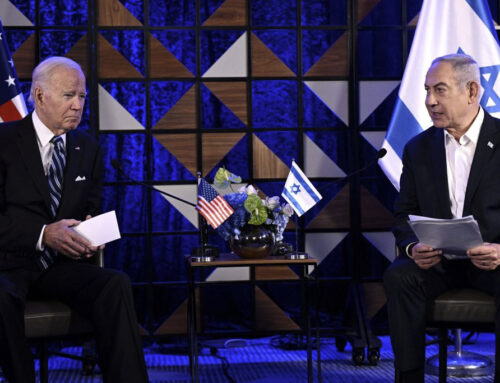H.M.S. Diamond, the British air defence destroyer on task in the Red Sea. Diamond has shot down a Houthi missile using her Sea Viper interceptors – AS1 Amber Mayall/Royal Air Force© Provided by The Telegraph
No one of sound mind desires war. No one who has been renewed of mind and spirit by the Spirit of God desires war.
But to ignore events, ignore reality, ignore facts and history is to be most negligent and irresponsible. There is a time for war — when the forces of evil are such that they rise up in an attempt to destroy all that is good and right.
Such was the case for World War II, do you not agree, no matter how peace loving and a pacifist you may be?
While we have a president and his administration that makes Neville Chamberlain look like the most rabid warmongering hawk in history, Islam is at war with U.S. and the West and has been at war with us and the West. This is more than a political ideology war. This has been and is a spiritual war. To the death. Do not shrug this off or think words can prevail, diplomacy solves the problems.
Words do not matter in this war. Not to the enemies of God, of Jesus, of the Holy Spirit, of the Holy Bible, of America, Western nations, and Western freedoms and liberties.
Islam desires two main things.
To create an Islamic caliphate worldwide. And in so doing this remove Israel and all Jews from the face of the earth. To attempt to remove or greatly weaken America to make it nonexistent in the world order of nations. To cause so much fear in the West that Islam is permitted to do whatever Islam desires. To enslave the world in Islamic law and beliefs.
As a result, Christianity would be suppressed, removed, and replaced with Islam.
This will never happen but Islam does not believe this. Islam does not think or believe or behave or fight as a Christian, a Western-minded person or nation does.
It is time folks come to realize that hundreds — HUNDREDS — of acts of war have been committed since October 7th, 2023 against Israel, against America, and against the Western way of life and belief.
Islam — Iran and the hundreds of millions of jihadists, fundamental Islamists know that they are at war and fighting to the death.
Deny, hide, call it something else — but World War III has begun.
Tragically, the Joseph Robinette Biden, Jr. administration and the U.S. government remain impotent. Lying. Hiding from the truth and reality. Deluded that appeasing Islam, appeasing Iran, giving them more money, and what they want will satisfy them and that our words, our hollow, empty words will stop them from their white-hot hatred of Christianity, Judaism, Israel, and every Western nation, freedom, and liberty.
We’ve tried and lived deluded ways for decades thinking that if we keep giving Islam, Iran, and every Islamic enemy what they want, handing them hundreds of billions of U.S. taxpayer dollars they will suddenly see the light and want to be like U.S.
What utter blindness and foolishness!
Just because American politicians can be so easily bought and paid for, bribed and sold like a commodity, lacking any real faith, not truly Christian, not truly as committed as their words claim does not mean our enemies are like us in that regard.
Islam wants to see America and Israel removed from the face of the earth. Especially Iranian Islamic forces. In bed with communist China and Russia.
And we do nothing. Except permit the escalation. The acts of war to increase.
What to do?
Well, certainly pray for the Lord’s will to be done. Not our will, but God’s will be done here on earth. That means primarily, as a true Christian, to spread the whole gospel.
It also means we should not remain idle or still as a nation if we want to remain free at all, and while I certainly do not want to see escalation of such a degree than thousands of human lives are lost we should, as a nation, along with Western allies, destroy every Iranian oil reserve and oil-producing field that exists. Warn the Iranian navy and then if they do not back down and retreat sink the Iranian navy. Take out every Houthi training facility and operation in Yemen.
And stop interfering with Israel and allow Mr. Netanyahu’s government, the IDF, and all of Israel to defend itself, secure its lands and borders [we could take a cue about this ourselves] and to remove the threat of Hamas once and for all. Removing the constant threat coming from Gaza.
Want peace? Truly? As much as can be accomplished in this sin-filled world?
Sometimes it takes retaliation, strong, heavy, brutal, determined retaliation against evil by force in order to bring any semblance of peace about.
Ken Pullen, Friday, January, 5th, 2024
Red Sea War: Houthi drone boat detonation opens a new chapter
Friday, January 5, 2024
By Tom Sharpe
Reprinted from The Telegraph
U.S. carrier Dwight D. Eisenhower pictured last November. The big ship is now operating to the south of the Bab-el-Mandeb strait, and her jets have shot down Houthi drones – Information Technician Second Class Ruskin Naval/US Navy© Provided by The Telegraph
Yesterday, the ongoing disruption of shipping in the Red Sea took an interesting turn. The Uncrewed Surface Vessel (USV), a threat well known to anyone who has operated in the Gulf in the last few years – and very well known to the Russian Black Sea Fleet, some of whom have taken up residency on the bottom as a result – made its appearance in the southern Red Sea.
So far, details are scant. Vice Admiral Cooper, the U.S. Fifth Fleet commander based in Bahrain, said:
“This was a one-way attack, unmanned surface vessel that had launched from Houthi-controlled territory, had transited out to international shipping lanes, clearly with the intent to do harm. Fortunately, it detonated. It’s unclear who the target vessel was…”
It’s a significant development for Operation Prosperity Guardian (OPG), the international naval effort whose aim seems to be something like “providing sufficient reassurance to shipping companies to restore the freedom of navigation in the Red Sea”.
First, it’s clear that the Houthis show no sign of slowing down, despite a joint statement from the governments of the United States, Australia, Bahrain, Belgium, Canada, Denmark, Germany, Italy, Japan, Netherlands, New Zealand, South Korea, Singapore and the United Kingdom on 3 December that this must not continue. The entirely defensive nature of OPG coupled with ‘stern warnings’ isn’t deterring the Houthis.
Second, the USV explosion will not help reassure the major shipping companies such as Maersk, MSC, Hapag-Lloyd and Evergreen who have elected to route around the Cape of Good Hope rather than run the Houthi gauntlet through the Bab-el-Mandeb chokepoint. For the big shippers, the strait truly is living up to its name: the Gate of Grief.
It is important to note that despite the big companies currently not making the transit, many ships still are. Whilst container shipping numbers are down 20 per cent, overall numbers are down by only a few percent. This reflects the complexity of the shipping business and the sheer number of vessels of all sizes and types who are happy to take the risk, do not believe themselves to be under threat and in some (probably illegal) cases, may even be assured of protection. However, whilst ‘the big ones’ are wobbling, short-term rates for container shipping have increased by 173% from mid-December. This and other costly trends are only going one way and will do so until the situation settles. The arrival of USVs on the scene will not help.
Third, the USV provides a tactical dilemma for the warships of OPG who are tasked to defend against the differing threats there. I postulated a while ago that these ships will be operating in air defence boxes up the eastern side of the Southern Red Sea in which they have responsibility for providing cover from missiles and drones, and that occasionally, they would be detached to provide escort cover for specific ships. This methodology was confirmed yesterday by Admiral Cooper.
The USV threat changes a couple of things. First, it puts more emphasis on the requirement for persistent fast jet and helicopter cover – these are the best ways to deal with USVs. Aviation fuel bills for OPG just went up. Second, the ships in the boxes nearest where this threat is based now have to deal with both air and surface threats. This can be done concurrently but with as little as thirty seconds warning time for the very fastest missile threat, it is not easy.
Arleigh Burke class destroyer U.S.S. Laboon, one of the warships now operating in the Red Sea, fires a missile on a previous occasion – Reuters© Provided by The Telegraph
On its own, a single USV isn’t a problem. However, send a swarm of them and it is a different matter. And swarm tactics are Navy Warfare 101 for the country that is both training and supplying the Houthis. Added to this is the vast amount of small boat traffic zipping around there anyway, fishing, smuggling and who knows what else. Under normal conditions you have to be on your guard because these things are fast, low in the water and don’t paint well on radar, but it used to be reasonably safe to assume that they’re not packed with explosives and heading for you. Now, the warships will have to assume that they are.
Finally, and perhaps most important, is the nature of the damage a USV would cause if it got through compared to the Houthis’ missiles. The latest missile and drone figures (courtesy of @Schizointel) show that in the last months, the Houthis have fired 14 anti-ship ballistic missiles, one anti-ship cruise missile, six land attack cruise missiles and 72 drones. Of these, the ships of OPG have defeated six ASBMs, six LACMs and 60 drones. This impressive strike rate of 77 per cent shows two things. First, the ships there are doing an outstanding job in a complex multi-threat environment and second, there is no such thing as a ‘probability-of-kill’ of 100 per cent. Hollywood leads you to believe there might be, real warfare does not.
So far, the missiles that have snuck through and struck targets have not been catastrophic. The fire on the chemical tanker MV Strinda on 12 December was probably the worst but the crew did an excellent job to bring it under control, no one died and there was no spillage. However, if a USV hits a vessel it will likely hole it at the waterline. It will be carrying a large explosive charge and even a double-hulled vessel is likely to be pierced. Best case, whatever is behind that hole spills into the Red Sea. Worst case, the ship sinks and people die. If the ship is an oil tanker or gas carrier, you’re looking at a major explosion.
Clearly, a 77 per cent reassurance isn’t enough for the major carriers just yet. So we need to ask: what is enough, how many ships and aircraft does that take, and how long can it be sustained? While OPG remains entirely defensive in the face of this steady stream of attacks, it’s hard to say that a sustainably reassuring solution is achievable, no matter how much excellent work goes into improving civil-military liaison at sea.
So the Houthis will continue to excel at keeping their activity sub-threshold, sapping resources and sowing discord. It’s a very effective operation.
Meanwhile, quite apart from destructive warfare from the Houthis, actual pirates are making a comeback. The Houthi helicopter hijack of Galaxy Leader on 22 November stole the headlines but MV Ruen has been at anchor off Somaliland since 14 December. Yesterday another vessel was taken 460 nautical miles to the east in the middle of the Indian Ocean. The old game of seizing ships to make money, as opposed to making a political point, has begun again. That this is emerging as an issue for the first time since 2017 isn’t a coincidence.
It will also probably not be that long before a mine is seen (either real or imagined) in the Bab-el-Mandeb. The main strait is several hundred metres deep, so not a good place for moored or seabed mines, but drifting unmoored floating mines can be released anywhere. They’re illegal under the Hague Convention, and ironically enough Iran did sign up to this back in 1907, but today’s mullahs haven’t felt bound by this in previous Gulf mining campaigns. The one good thing about drifting mines is that they’re much easier to see and dispose of (by simply shooting them so that they sink or blow up) than other kinds of mine. An even better method is destroying the craft that lays them. Even so, in big enough numbers mines could be a real problem.
So OPG continues to take shape in the face of a diversifying threat, masses of ongoing liaison work across the vast shipping sector, countries joining, countries joining with caveats/agendas and countries who have vested interests there but are not bothering. We must give OPG time – the threat, merchant vessel complexity and political uncertainty demand it. Ultimately though, a purely defensive naval operation is unlikely to deliver sustainable reassurance.
An operation which was allowed to make offensive strikes into Houthi territory, I believe, could deliver such reassurance: but thus far the White House has declined to cross that line and those allies which could act have decided to follow the U.S. In my view, the emergence of USVs won’t change that – but it will if one gets through.
Hope is not a strategy.
Tom Sharpe is a former Royal Navy officer and surface combatant warship captain, with experience in the Gulf and Red Sea









Leave a Reply, please --- thank you.